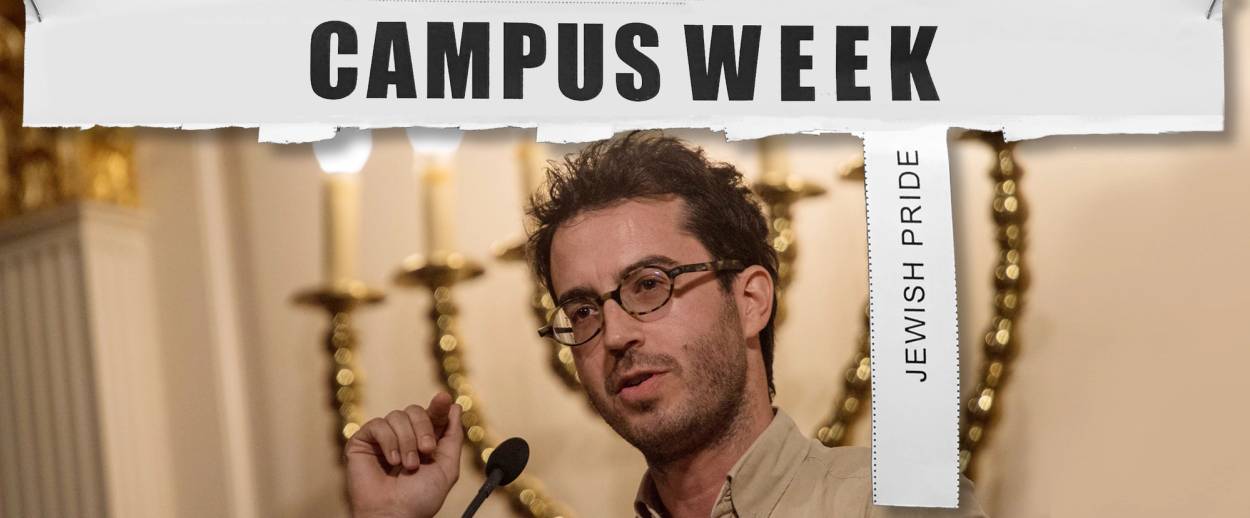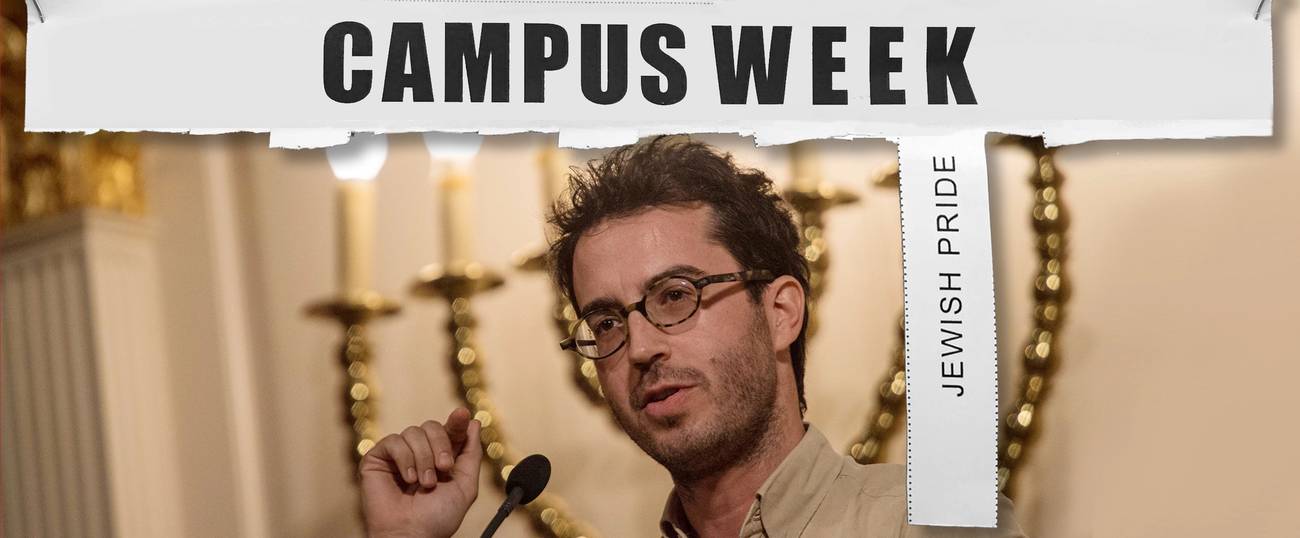Jonathan Safran Foer’s Nice-Jewish-Boy Fiction
Campus Week: The bestselling writer’s ambitious new ‘Here I Am’ represents the triumph of sentimentality and sincerity over irony and anger, which is a great loss




Your feelings about Here I Am, the ambitious new novel by Jonathan Safran Foer, will largely depend on how you feel about lines like these:
“The older one gets, the harder it is to account for time. Children ask, ‘Are we there yet?’ Adults: ‘How did we get here so quickly?’”
“The sound of time. What happened to it?”
“What would it sound like to cry in Jewish?”
“And there are no cures for the hurt that hurts most. There is only the medicine of believing one another’s pain, and being present for it.”

This kind of sentence seems to expect a sigh of wide-eyed approval for its innocence and wisdom. But Foer has always divided the sighers from the scoffers, because his apothegms have the form of literary writing without the substance. Literature makes language strange, unusual, arresting, because it wants to challenge assumptions and renovate perceptions; at the heart of the literary impulse is something antagonistic, a force of aggression against the received ideas that dominate our minds almost all the time. Foer’s sayings look like they have something new to tell us—they sound striking and original—but, in fact, they are telling us exactly what we already know, and are pleased with ourselves for knowing: Time flies. Life is painful. Jews are sad. Yet, because they tell these truths just a bit slant, they give us an unearned sense of accomplishment, as if we have challenged ourselves in a literary way when in fact we have only confirmed ourselves. That is the origin of the sigh: It is the purr of petted false consciousness.
Because Foer is one of the leading novelists of his generation, and surely the most successful of the Jewish novelists, his sentimentality is more than a vice; it is a symptom, and it has something important to tell us about both American fiction and American Judaism. When the literary history of our period is written, the key to the fiction of Foer’s cohort—roughly speaking, writers born in the 1960s and 1970s, who began to publish in the 1990s—will be its rejection of the cool affect and ironic disengagement of the previous generation. The major figure in this transformation was David Foster Wallace, whose Infinite Jest came out in 1996 (when Foer was 19). Wallace, in his fiction and his essays, led a frontal attack on irony in all its forms, from the cerebral experimentation of postmodern fiction to the cold grin of David Letterman’s omnidirectional satire. For Wallace, the key thing was to feel and to show feeling; and the writers who came out from under his bandanna agreed. The insistence on vulnerable emotion, often amplified by using children as main characters, is a hallmark of the work of Dave Eggers, Jonathan Lethem, Zadie Smith, and many of their contemporaries.
But none of them seized the opportunity to move and be moved as strongly as Foer. He has always been drawn to themes of maximum pity and terror—the Holocaust in Everything Is Illuminated, September 11 in Extremely Loud and Incredibly Close—and to the suffering of the helpless—Extremely Loud is narrated by a 9-year-old who loses his father in the World Trade Center, while the nonfiction Eating Animals went even further to confront the misery of factory-farmed animals. In Here I Am, we are once again in the presence of disaster and precocity, but with a difference. Now the main character is not a precocious child, but the father of precocious children; and the disaster is not a historical one, but a prospective, imaginary one. It is as though Foer does not quite trust himself to relinquish his most effective tools for evoking strong sentiment, even as he shows signs of wanting to move beyond them.
Here I Am tells the story of the Bloch family, a type we have met often before in fiction: Jewish, affluent, educated, yet unhappy. As the novel opens, Jacob and Julia, the parents, are confronting the death of their relationship—a death from natural causes, more or less, as the responsibilities and limitations of adult life take a toll on their intimate connection. They are preparing to divorce, especially after Julia discovers the secret cellphone on which Jacob has been exchanging graphic texts with another woman. Yet Jacob has not actually had sex with this other woman, whose name we never learn; and this reluctance to allow his character to actually commit a sin feels like a result of Foer’s protective affection toward his creations. The one thing he doesn’t want, clearly, is for us to dislike either Jacob or Julia—not to mention the adorably neurotic and strangely insightful Bloch children, Sam, Max, and Benjy, who talk like a cross between Salinger’s Glass family and the Huxtables. (Sam in his bar mitzvah speech: “I’ve never thought about it until right now, but it occurs to me that I don’t know if I’ve ever actually tried to stop anything from happening in my life. I mean, obviously I’ve tried to get out of the way of inside pitches, and I make a lot of efforts not to use urinals without vertical privacy shields, but an event.”)
This insistence on likability feels like another example of Foer’s discomfort with literary aggression. And the avoidance or baffling of aggression is what distinguishes Foer most profoundly from the classic American Jewish novelists whose mantle he now carries. When you think of writers like Henry Roth, Philip Roth, or Saul Bellow, what you remember is their tremendous animus against the Jewish family, their determination to escape the prison of its perverse love. When Alexander Portnoy masturbated into the family’s dinner, he was striking a blow for anarchic sexuality against the smothering of familial affection. But when Foer writes an aria about Sam Bloch’s addiction to masturbation, he is performing an act of filial piety—piety toward Roth. Nor would Jacob and Julia ever be dismayed if they discovered their son’s masturbation; unlike Mrs. Portnoy, they would surely have an enlightened view about the importance of free sexual development. A different kind of writer might make a conflict out of that very enlightenment: How would Sam rebel, sexually, against a father who himself writes pornographic texts to his mistress?
But that kind of elemental conflict is absent from Here I Am, which insists on loving everyone. It even—especially—loves rebellion against Judaism and Jewishness. Indeed, the novel can be read as an extremely damning indictment of American Jewishness today. Foer makes clear that the Blochs are religiously ignorant, tied to a few remaining rituals out of guilt and inertia. For Jacob, in particular, Jewishness is less a faith than a syndrome, the familiar Portnoy affliction of intellectuality, timidity, sexual obsession, constipation, and physical weakness. American Jews are plagued, above all, by an inferiority complex with regard to Israelis, who are both better Jews and better human beings. For Jacob, the point of contrast is his Israeli cousin Tamir, who in a crucial episode persuaded the teenage Jacob to overcome his fears and jump into an actual lion’s den at the Washington Zoo. (The point of reference here is not just the Book of Daniel but, still more, Bellow’s Henderson the Rain King—another act of literary filial homage.)
The Blochs’ noncommittal attitude toward their own Jewishness is finally challenged by the big imaginary disaster in the novel. An earthquake strikes Israel, leaving it vulnerable to invasion by Arab armies, and the prime minister sends out a plea to the world’s Jews to come join the fight. Will Jacob seize this opportunity to redeem his manhood and finally be a wholehearted, committed Jew? Or will he decide that his true home is the Bloch family, that his place is in America with his children? I won’t give away this central plot point. But character is destiny, and in the end, Jacob makes the only choice conceivable given what we already know of his personality. What is more important is that Foer, having conjured up a world-historical Jewish catastrophe, is clearly at a loss for what to do with it. The Israel disaster takes place mainly in the margins of the characters’ and the book’s consciousness and, in the end, it resolves itself with remarkable tidiness.
This inability of the novel to compass its own subject matter—the subordination of historical suffering to the comedy of character—feels very much a part of the bourgeois complacency that characterizes both the Blochs and the novel about the Blochs. Class is a big missing element of Here I Am: Like people on TV, Jacob and Julia Bloch seem to live well beyond the means afforded them by their nominal jobs, which they are never seen to be actually doing. (Jacob is a TV writer: Do TV writers live in Washington, D.C., as the Blochs do?) Foer mockingly lists all the expensive accouterments of the Blochs’ lives—the luxury paints, appliances, skin creams—but this mockery is not grounded in any alternative, less materialistic system of values; it ends up reading more like embarrassment than Roth-like indignation.
Indeed, embarrassment is the extreme of emotion in Here I Am: Jacob is embarrassed to be caught sexting; Sam is embarrassed when it is discovered that he has written a list of bad words at Hebrew school; American Jews are embarrassed not to be Israeli Jews. But embarrassment is not humiliation or shame because it expects forgiveness; and in Foer’s novel that is what it receives, over and over again. The American Jewish novel once had the boldness to rebel, because it was convinced of the power of what it was rebelling against—religion, family, materialism, hypocrisy. Now that American Jewishness itself seems so frail, its novelists can summon up no such aggression. What we have instead is a sigh.
***
To read more from Tablet magazine’s special Campus Week series of stories, click here.
Adam Kirsch is a poet and literary critic, whose books include The People and the Books: 18 Classics of Jewish Literature.